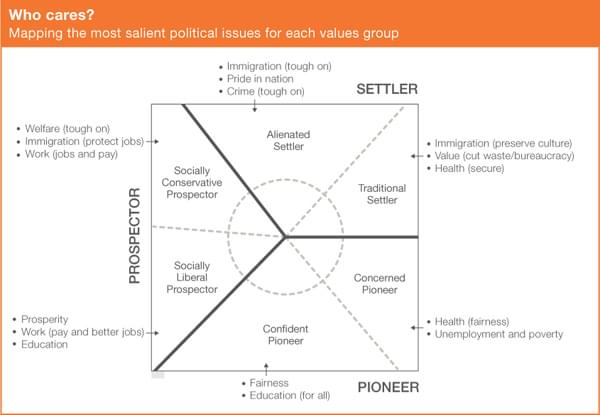The new electorate: Why understanding values is the key to electoral success
Article
'Pecorelli's perspective points to the importance of engaging with the deeply held concerns and sentiments of broad groups of the electorate and the need to develop messages and strategies which build common concern among them. Camping out in narrow sections of the electorate will not work for those seeking an electoral majority or aiming to govern in the national interest.'
Foreword, by Nick Pearce and Graeme Cooke
This report identifies three main voter values groups:
- Settlers (socially conservative and focused on security and belonging)
- Prospectors (aspirant, optimistic and desiring status and esteem)
- Pioneers (focused on fairness, with generally more 'post-materialistic' goals).
Unlike the US, Britain has a very evenly divided electorate, with around a third of voters in each major group. This highlights the need for politicians to bridge the divides between voter groups; targeting any single group is not a recipe for electoral success.
Each of the main voter groups can then be broken down into four subgroups (visit The Campaign Company website to take the test for yourself). Analysis of recent trends shows that the 'louder' groups, with more divergent, strongly held views, are becoming predominant over the 'quieter' groups with a more centrist perspective. The six 'loud' groups are the primary focus of this report: the Alienated and Traditional Settler, the Concerned and Confident Pioneer, the Socially Conservative and Socially Liberal Prospector.
Using this model, the report outlines:
- major trends in the British electorate, including the shift away from the centre-ground, towards the louder 'outer' values groups
- an analysis of five major themes in political debate: optimism and pessimism; aspiration and lack of aspiration; social conservatism and social liberalism; tradition and modernity; responsibility and fairness
- the recent history of support for the major political parties, and of the loyalty or 'poachability' of different values groups for different parties
- the key political battlegrounds, including for Labour with the Liberal Democrats (the Confident Pioneers) and Labour versus the Conservatives (both Settler groups and the Socially Conservative Prospectors)
- lessons for how to frame political messages and build political coalitions that appeal across the value divides - offering each group 'enough of what they really want'. The diagram below shows how today's key issues are spread across the values groups.
This new analysis by The Campaign Company is based on four decades of findings from the British Values survey, four polls conducted in 2011 and 2012, and over 200 focus groups.
Related items

The full-speed economy: Does running a hotter economy benefit workers?
How a slightly hotter economy might be able to boost future growth.
Making the most of it: Unitarisation, hyperlocal democratic renewal and community empowerment
Local government reorganisation need not result in a weakening of democracy at the local level.
Transport and growth: Reforming transport investment for place-based growth
The ability to deliver transformative public transport is not constrained by a lack of ideas, public support or local ambition. It is constrained by the way decisions are taken at the national level.
